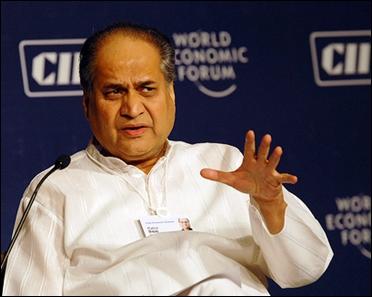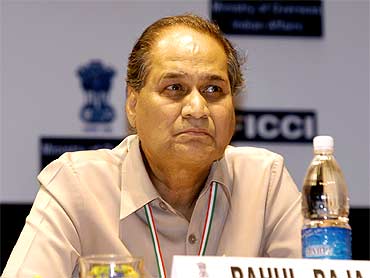Photographs: Reuters Tanmoy Goswami and Poornima Subramanian
The objective of a business is to efficiently meet the needs of its customers. And in doing so, business can create profit.
Just as no business can take special credit for doing 'social good' by way of meeting the needs of customers, society should also not be prejudiced against profit.
And, somewhere in the intersection of these simple truths lies the conscience of a business, as well as the state's attempts to mandate it.
. . .
Rahul Bajaj on 2 things that matter most in business
Long before the Maruti 800 story, the Bajaj scooter was synonymous with aspirations and mobility for the Indian middle class. This must have been a phenomenal position of responsibility for the company. What are the values that have stayed with you since your inception through to the current day?
To my mind, two things matter in a business. First, what is the objective of the business? Some say it is to make profits. To me, this is not accurate though many believe so.
I believe that the objective of a business is to satisfactorily meet the needs of a customer.
Why does one start a business? To satisfy a need -- whether it is a paan (betel nut) shop, a laundry, or a steel plant.
. . .
Rahul Bajaj on 2 things that matter most in business
Similarly, we started Bajaj Auto because mobility was a need, people could not afford cars and public transport was inefficient or non-existent.
In today's competitive economy, if you do not meet customer requirements satisfactorily, you may have to close shop. We need not pat our backs because we have done something good for our customers. We have simply tried to meet their needs satisfactorily, efficiently.
Profits and employment are important byproducts of this process. If you do not satisfy customer needs, you can neither make a profit nor create jobs.
Your business has to be meaningful. You can dig a well and fill it up and say I am providing employment in the country. But that is meaningless.
. . .
Rahul Bajaj on 2 things that matter most in business
Any business has to produce assets for the country. The output has to have more value than the input. Meeting a need is good, but every business does that for its own good, nobody can take special credit.
The second thing that is important in a business is that it should be done ethically. I do not use the term 'corporate governance' because it is a given, a legal requirement.
Twenty years ago, nobody had heard of it. But the concept of ethical business is timeless.
. . .
Rahul Bajaj on 2 things that matter most in business
Let's talk about the prevalent legislative mood in the country. The government's wish list includes a lot of changes, including a mandatory 2% spending on CSR by corporates, which it held on to until recently. How do you view these developments?
Yes, change seems to be the mood of the season.
The corporate affairs ministry is making many changes in the Companies Bill. The Competition Commission has also notified regulations (new merger & acquisition norms, according to which corporations which meet a certain threshold will have to inform the Commission before any transaction) that will come into effect from in June.
I believe the way they were initially worded, they could have created unnecessary problems.
. . .
Rahul Bajaj on 2 things that matter most in business
On the issue of making CSR spending mandatory, I spoke my mind at the March 31, 2011 meeting of the Prime Minister's Council on Trade and Industry.
I said that it does not matter whether the rate is 2%, 0.25% or 3%. Most corporates are investing in CSR -- with much more efficiency than the average government organisation can do.
The Bajaj family -- everybody knows the legacy of Jamnalal Bajaj -- started giving back to society well before the term CSR was even coined.
. . .
Rahul Bajaj on 2 things that matter most in business
What I cannot understand is, how can there be a mandate for generosity, largesse, one's conscience? If the government needs more money for social development from us, let it hike the corporate tax rate. But it should not mandate CSR.
At most, it can indicate its desire. Even then, can the government send out a signal that it has a conscience which is better than the individual citizen's? What are we trying to achieve?
So many things are mandated anyway. We have the Indian Penal Code, Criminal Procedure Code, Companies Act . . . now will even this be mandated?
. . .
Rahul Bajaj on 2 things that matter most in business
Photographs: Reuters
Of course, there is a view that 'corporations are making so much money; why can't they spend some more on CSR?' This has little meaning to me for making CSR spend mandatory.
There is a possibility that CSR will not be made mandatory, but every year a company will have to take a proposal to that effect to the AGM, and the shareholders will decide. What will be the implication of this for a company?
To take any proposal to the shareholders, a company has to get board approval. Even if the board gives its approval, the question will remain as majority shareholders can vote against it at the AGM. The whole exercise may be futile.
. . .
Rahul Bajaj on 2 things that matter most in business
The problem runs deeper. The moment mandatory CSR becomes law, we may be opening up the floodgates for corruption. Politicians may start demanding donations to their charities.
There is a view that CSR is an extension of corporate governance.
Corporate governance, as I understand it, has nothing to do with CSR. Each balance sheet has to have a chapter on corporate governance. This is a part of Sebi regulations, covering various areas such as independent directors, auditors, capability and rotation of directors, etc.
. . .
Rahul Bajaj on 2 things that matter most in business
Then there is Sebi's Clause 49. These are the basic, minimum requirements. CSR should not be subject to such regulations. It is a separate subject.
Isn't being socially responsible a natural corollary of good corporate governance?
Let me ask you a basic question: can you define CSR for me?
If you ask the government to define CSR -- which is the first thing you need to do if you are thinking of making it mandatory -- it may say no, we want to leave it to you.
Are CSR and philanthropy the same? You tell me!
For instance, we are adopting three ITIs, two in Maharashtra, one in Uttarakhand. One could categorically say that this is CSR.
. . .
Rahul Bajaj on 2 things that matter most in business
Now take another example: we are taking care of the HIV-AIDS treatment facilities at the YB Chavan Memorial Hospital in Pune. There is a tripartite agreement between us, the municipal corporation that owns the hospital and NACO.
We have donated R 7 crore (Rs 70 million) to IIT Bombay for a technology innovation centre and creating four chairs. This can also be part of CSR.
Now my question is, why are these not philanthropy? Strictly speaking, these activities have nothing to do with the Bajaj Group's corporate affairs at all.
Or, consider any environmental best practice for that matter. As a vehicle manufacturer, it is important that we produce vehicles that meet emission standards.
But will the R&D money spent on that be taken as CSR? Our vehicles will not be registered if they do not meet emission standards. There are many issues like these.
. . .
Rahul Bajaj on 2 things that matter most in business
Where do we draw the line and why should we want to draw a line in the first place?
My view is simple. Corporations produce wealth and employment for the country. There are always going to be some bad apples who will find a way to beat the system, no matter how stringent corporate governance or Sebi guidelines are.
We have seen that in India too. The nexus between corporations and politicians is a serious problem. But does this mean there should be unnecessary guidelines?
In view of all the corruption and black money issues, I believe, change will come, may be gradually. It will come due to media assertiveness, new Supreme Court activism, Anna Hazare's crusade, public opinion, etc.
Excerpted from The Smart Manager, May-June2011 Issue.













article